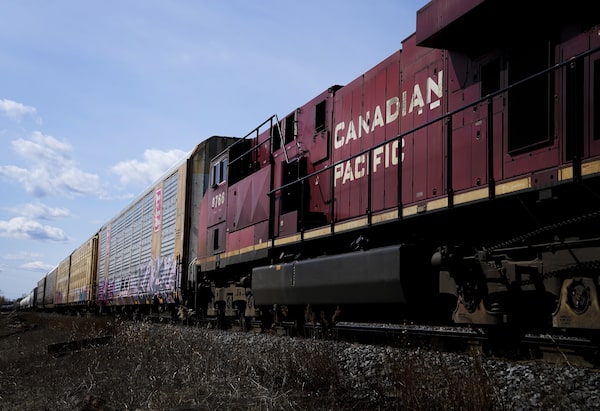
With a U.S. regulator poised to make its final decision within weeks, Canadian Pacific Railway Ltd.'s CEO says the company is "ready to roll" on its proposed merger with Kansas City Southern. Canadian Pacific Railway trains sit at the main CP Rail trainyard in Toronto on Monday, March 21, 2022. THE CANADIAN PRESS/Nathan DenetteNathan Denette/The Canadian Press
Canadian Pacific Kansas City Ltd. CP-T made multimillion-dollar stock awards to top executives in 2023 after the railway completed a deal to expand its routes to Mexico.
CPKC valued the “synergy performance awards” at amounts ranging from $3-million to nearly $5-million for each of four executive vice-presidents, named in the company’s proxy circular, who reported to chief executive officer Keith Creel. As a result, total compensation for each of the four men topped $10-million in 2023. Mr. Creel – whose pay climbed to $20.1-million in 2023 – did not receive the award, which CPKC says was limited to “a small group of key senior leaders.”
The stock awards, given in May, have vesting conditions based on the achievement of “EBITDA synergies,” or merger-related gains in earnings before interest, taxes, depreciation and amortization, and the performance of CPKC stock versus its peers. There’s an opportunity the awards can be multiplied by 2.5 on payout if “exceptional synergy results are achieved” and CPKC stock finishes first in the measurement period, which ends in December, 2026.
CPKC bought Kansas City Southern in 2021 for US$27-billion and integrated the two companies in April, 2023, after U.S. regulators blessed the deal. The transaction meant CPKC was able to form the first railway that connected all of North America, extending into Mexico’s automotive and agricultural centres and ports on both coasts.
Closing the deal, followed by an integration with “no service interruptions or negative impacts on customers, communities, connecting railroads or safety,” was the top achievement CPKC listed for Mr. Creel as it explained his pay package.
Mr. Creel’s $20.1-million in 2023 was up from $14.5-million in 2022. His 2023 pay included a salary of $1.82-million, up from $1.56-million in 2022, and a cash bonus of $3.83-million, up from $566,066 in the prior year. CPKC valued his share awards, a mix of stock and options, at $13.77-million, up from $11.62-million in 2022.
In paying annual bonuses, CPKC scored its corporate performance factor at 140 per cent, contributing to above-target payouts. The company says it surpassed targets for profits, expense management and two of three safety measures.
CPKC stock has been a long-term performer. It was once worth a fraction of the market value of Canadian National Railway Co. but has now caught up. That has benefited Mr. Creel, who joined Canadian Pacific Railway in February, 2013, as president and chief operating officer and became chief executive officer in January, 2017.
CPKC estimated that he held stock options with $90.3-million in potential profits on Dec. 31, 2023, based on the $104.84 closing share price on the TSX at year-end. He held $16.1-million in share-based awards that had not vested and $28.7-million of share-based awards that had not yet been paid out at the end of 2023. (CPKC shares are now pushing 52-week highs, closing above $120 over the last several days.)
At CN, chief executive Tracy Robinson completed her first full year on the job in 2023 after working as an executive in the oilpatch and at CPKC. She replaced Jean-Jacques Ruest, who exited after a proxy battle launched by shareholder TCI International. TCI decried the financial risk of CN’s failed bid for Kansas City Southern.
Ms. Robinson received total compensation of just over $14-million. She received a salary of $1.28-million, a bonus of $1.31-million and share awards valued at $10.92-million.
CN paid out annual bonuses to its top executives at just 69 per cent of target. It missed financial targets for revenue, profits and free cash flow but exceeded goals for safety and employee engagement.
CN spokesperson Jonathan Abecassis said the company managed costs, as measured by its operating ratio, “amongst the best in the industry.” The bonus payout, he said, was “impacted by weaker than expected economic conditions that reduced demand across the industry, as well as a record Canadian wildfire season, floods and a labour disruption at ports served by CN.”
Chief financial officer Ghislain Houle made $4.18-million in total compensation. Nadeem Velani, CPKC’s chief financial officer, made $11.93-million, including the $4.97-million special stock award. CN’s chief marketing officer Doug MacDonald made $3.32-million, while CPKC’s chief marketing officer John Brooks made $10.64-million, including the $4.37-million special stock award.
Three other CN executives named in the proxy as the top paid made between $2-million and $3.7-million. CPKC’s other top-paid executives were chief operating officer Mark Redd, who made $10.36-million, including the $4.34-million special stock award, and chief transformation officer John Orr, who made $10.45-million, including the $3.05-million special stock award.
Mr. Orr, who spent 34 years at CN through 2019, was vice-president of operations at Kansas City Southern before the CPKC acquisition and led the integration of the Mexican division.
He left CPKC in March to join Norfolk Southern Corp. as its chief operating officer. Norfolk Southern paid CPKC US$25-million, plus other “operational and commercial considerations,” to waive Mr. Orr’s noncompete clause. Such departures typically require forfeiting unvested stock awards; CPKC says the special synergies award requires the recipient to still be employed at the company on Dec. 1, 2026.
CPKC says Mr. Orr will not be replaced.
 David Milstead
David Milstead Eric Atkins
Eric Atkins